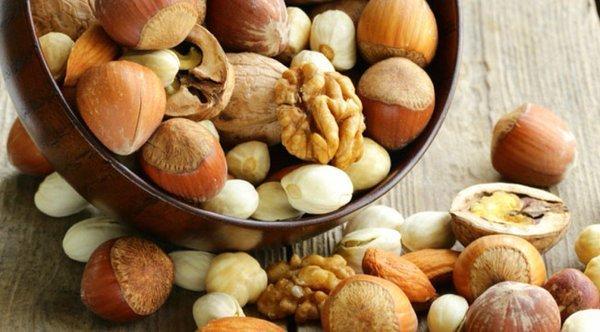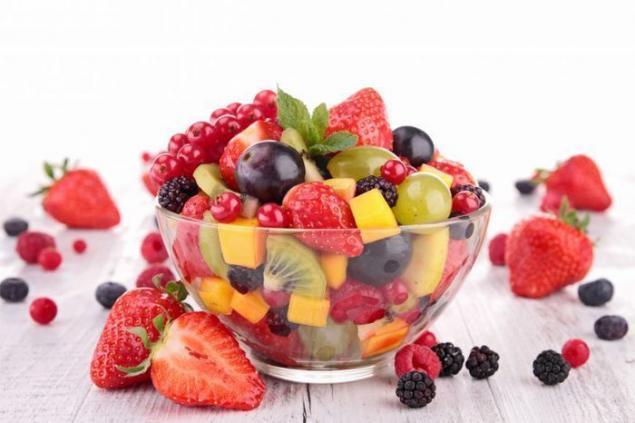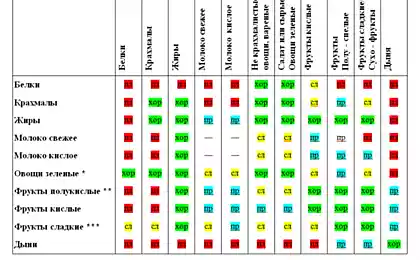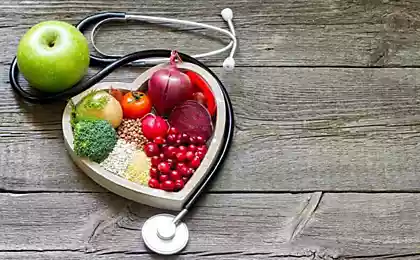884
Pure poison! How wrong combination of products makes the poison in your food
Herbert Shelton: sandwich - not an invention of nature
We understand that to convince you unfit for digestion sandwich with sausage or some more gourmet sandwiches, we are unlikely to once and for all. But they say the water wears away the stone. What writes clever Shelton, it belongs to the category Education. Enlighten to start. And God forbid that you do not have to apply to the Council Shelton when the bell unpleasant call.
Protein - a protein
Never eat two concentrated proteins at one meal. Do not take in one meal nuts, meat, eggs, or meat, or cheese and nuts, or cheese and eggs ... milk, if it is at all to consume, it is best to take apart. Dr. Gibson says: "The best way to deal with milk - or eat it separately, or even to abandon it." The only exception for the sour fruit can be done here.

The common prejudice that lemons, berries, cucumbers and the like with the milk is dangerous to consume, has no basis. Two proteins of different species and different compositions that require different digestive juices, and various concentrations allocated to the stomach at different times, it is impossible to consume at one time. Rule should be: a protein in one step.
In everything that we eat has protein. But in most kinds of food it is so small that we ignore it in the food combinations. All food combining rules should only relate to concentrated starches, sugars, fats and proteins.
Raise objections that because different proteins in their amino acid content are quite different from each other and the body requires them to an appropriate amount, it is necessary at once to consume more than one protein to provide the demand for it. Most people have three daily meals, or twenty one time per week. And because so many eating and between the main meals, then recruited more meals per week. You can not see the logic in such need of fullness in one sitting.
Sufficient variety of proteins can be achieved by administering different proteins with different meals. Is it not remarkable that the strongest juice stands for milk secretion in the last hour?
Do not follow the orthodox Jews physiologically correct practice when refraining from sharing consumption of milk and meat?
Eggs require different time allocation juice than meat or milk. And then not whether to apply them separately from meat and milk? Probably, the disastrous consequences of overfeeding tuberculosis patients with milk and eggs is attributable, at least in part, intake of such food indigestible mixture.
Protein - Fats
Do not eat fats with proteins. That is, do not eat the cream, butter, vegetable oil, meat, eggs, cheese, nuts and other proteins. Fat inhibits the action of the gastric glands and inhibits the release of the respective gastric juices of meat, nuts, eggs and other proteins.
Fats, mixed with food, delay the development of a delicious juice, reduce the amount thereof. The presence of fat in the stomach juice reduces biochemical production. Fatty acids weaken the work of the gastric juice, reduce the activity of gastric juice, reduce the amount of pepsin and hydrochloric acid, can reduce the overall digestive activity by more than 5-10 percent. This inhibitory effect may come from fat even in the intestine.

Vegetable oil introduced directly intestine reduces gastric acid, although its quality does not change (oil harmful enemas).
One of my correspondents, professor of anatomy at the University of Columbus (Ohio) William Byrd believes that the combination of fat and starch - is a bad combination. He says: "According to Cannon, fats remain in the stomach for a long time if taken individually, but when combined with other foods significantly delay the passage of the gatekeeper in
. Under normal conditions, starches are retained in the stomach for a relatively short. But, restraining the passage of the starch from the stomach into the intestine due to the presence of fat in the stomach, we create an excellent opportunity for the fermentation, especially for those who have a lower energy or for other reasons have weak digestive powers. "
The less complex food mixture, the simpler our food, the more effective digestion can be expected.
Dr. Byrd states that, according to his experiments, to cause unrest, need a little fat in combination with the starch. At the same time, the Academician Pavlov pointed out that fat and starch (bread and butter) are less difficult to digest, and said: "Bread requires for himself only a little gastric juice and a little acid, and animal fat, stimulating the pancreas provides a large selection enzyme for themselves and for the starch and protein bread. »
Regarding the effect of the combination of "fat - starch" on the digestive secretion, it is very close to the recognition of the principle of food incompatibilities. He wrote: "In this case, there is no struggle between several food components, and therefore none of them does not suffer." It should be noted that the combination of "fats - starch" is not only good for the stomach, but equally and intestine.
Acid - protein
Do not eat acid fruits with proteins. Oranges, lemons, tomatoes, pineapple and the like acids can not be eaten with meat, eggs, cheese, nuts. Academician Pavlov has convincingly demonstrated the inhibitory effect of acids such as fruit acids, and the effects of acid fermentation, digestion. Acidic fruits, inhibiting the secretion of gastric juice (continuous release which urgently requires protein food), greatly retard digestion of proteins, which leads to their degradation.
Nuts and fresh cheese - hardly probable not the only protein foods that do not quickly decompose in such conditions, but their uptake is still delayed. Acids do not inhibit the secretion of gastric juice only to the same extent as fat nuts or cottage cheese.
In contrast to the view of certain circles, like orange, grapefruit, pineapple and other fruit juices contribute to the absorption of proteins, in fact such acids actually retard digestion of proteins. The so-called health experts and nutritionists who ignore this fact and continue to recommend acidic fruit drinks during meals, not worthy of the trust that they have those who seek their advice. Lemon juice, vinegar, marinades, and other when mixed with food delay the release of hydrochloric acid in the stomach. Just as hydrochloric acid prevents release acids also inhibit release of pepsin and soda lye, which reduce the acidity in the stomach.
I could not find evidence that acid addition of hydrochloric acid, pepsin activate. In any case, there is no need for additional acids, because the stomach is able to provide all the acids required for the creation of an enabling environment, which may act pepsin, and provide it at the right time. Additional acid is not likely to help digestion of protein, and inhibit or delay the release of digestive juices. Gastric juice is not released in response to the presence of acid in the mouth and stomach.
Milk and orange juice, in themselves in any way non-digestible, far from being a good combination. Orange juice and eggs make up an even worse combination. Equally bad are a combination of meat and pineapple, pineapple juice does not assimilate meat. It should be remembered that the meat is not digested by another acid, except pepsin. Hydrochloric acid of the stomach creates the necessary environment for the action of pepsin.
Sugar - Starch
Do not eat starches and sugar in one meal. Jellies, jams, fruit, butter, sugar, honey, syrups, molasses and other containing sugar, on bread or in a reception with cereals, potatoes, sugar with cereal, and so on cause fermentation. Disgusting hot cakes with honey or syrup.
The practice of consumption of starches, sweets covers up - a bad way to carbohydrate intake. When sugar enters the mouth, it quickly fills with saliva, which, however, no ptyalin. At the same time ptyalin need to digest starch. If starch is covered with sugar, jelly, jam, syrup and the like, the taste end misled.
The monosaccharides and disaccharides will roam than polysaccharides, and they tend to ferment in the stomach, while there is pending the completion of digestion of starch. Sweet fruit starches with the same cause fermentation and produce the same decomposition products as sugar, gelatin, syrup. We do not need to consume them with starches. According to Dr. William Porter (in his book "Eating for Longevity"), the consumption of fruits is "one of the most harmful and repeated dietary misconceptions»
. But even he admits that the fruit, eaten without any other food, are suitable. He argues that the fruits prevented the assimilation of other foods. Porter just need to understand the combination of food.
Due to the fact that the fruits of all kinds can not be combined with other products, we have condemned as a violation of neurochemical digestion laws increasing number of mixtures: fruit - bread, raisin - bread, dates - bread, plums - bread, bananas - bread, fruit and substitutes coffee and so on. All these things have only one justification for its existence - they encourage the consumer to consume more grain and thus lead to an increase in product sales. But every person they cause undigested in the stomach.

Inactive saliva is released in large quantities on a dry or covered with powdered sugar bread to moisten it and help him to swallow. But no amount of saliva is not allocated for fresh meat. Likewise, a lot of saliva (this time active) stands on dry starch for its moisturizing and absorption. No saliva is not allocated to the boiled starch or wet.
M. Austin writes "Products assimilable alone or in certain combinations, are often incompatible in other combinations. For example, bread and butter, consumed together, do not cause trouble, but when you add them to the sugar, jam, marmalade can cause an upset. For, as the sugar will be consumed first, the conversion of starch into sugar bread will be delayed. Mixtures of starch and sugar cause fermentation with concomitant harmful effects. "
Most of us know that no assimilation of sugar, syrup, honey, and other sweets occurs in the mouth and stomach. So what need delay any sugars in the stomach in anticipation of protein or starch digestion? When this happens, the fermentation is inevitable. Sugar and starch is fermented. This means sour stomach. This means discomfort. Those who are inclined to consume honey and subject to popular belief, like honey - "natural sweetness", should know that the rule - not to eat sweets with starch - also applies to honey. Indifferent, honey or syrup it, but consumed with cereal, for sweetening, they cause fermentation. White or brown sugar, raw sugar, sugar, brown under simulated (ie, colored), dark syrup, other syrups, eaten with starches - all this means fermentation. Soda neutralizes the acid formed, but does not stop the fermentation itself.
Starch - starch
Eat only one concentrated starch in one step. Rule consume only one starchy food at once, apparently, is even more important as a means to avoid overeating starches, rather than as a means to avoid bad combinations of food. While overeating starches can lead to fermentation, the combination of the two starches may not necessarily cause it.
Many argue that a living organism is experiencing unwavering need and inclination to any particular type of starch at a certain time. If two or more kinds of starch consumed in one meal, at the same time, one of the starches are graded for digestion and assimilation, and the other remains intact in the stomach, not only passed for further digestion in the intestine, but delaying the digestion of other food with accompanying results in the form of fermented, sour stomach, belching.
Starch is one. There is a wide variety of starchy foods. Perhaps starch degrading enzymes show preference for a certain starchy foods, although I can not find the physiological basis. Just as I can not see, and two fermentation of starches in their consumption in a small amount. I believe that the main reason for not to consume two of starch in one meal, is to avoid eating them.
Some biochemists argue that consumption of bread and potatoes at the same time limited to our need for starch. Hygienists also recommend only one starch in one step, and not because there is any conflict between the two, but because this leads to the actual consumption of the substance overeating. We believe the best option, and this applies to feeding patients, to limit the consumption of starch intake of starch once.
People with an unusual ability to self-control can afford two starch in one step, but such individuals are so rare that the rule should be: one starch in one meal.

Explaining the rules jokingly carbohydrate intake, Dr. K. Fredericks wrote, "is not served at one time more than two kinds of foods rich in sugar or starch. If you are applying the bread and potatoes, your limit on starch exhausted. »
More than forty years in the circles hygienists rule is to consume only one starch in one meal and no sugary foods with starches. But for sugar, syrups, honey, muffins, pies, sweet and other additives with starches is not taboo. We do not say to those who come to us for advice: "If you eat your food with starch, bring a portion of the baking soda." We ask them to avoid sugar with starch and thereby fermentation, which in this case is inevitable. Among hygienists considered the height of folly to take the poison and the antidote then. We prefer not to take poison.
From the book by Herbert Shelton "Ortotrofiya"
We understand that to convince you unfit for digestion sandwich with sausage or some more gourmet sandwiches, we are unlikely to once and for all. But they say the water wears away the stone. What writes clever Shelton, it belongs to the category Education. Enlighten to start. And God forbid that you do not have to apply to the Council Shelton when the bell unpleasant call.
Protein - a protein
Never eat two concentrated proteins at one meal. Do not take in one meal nuts, meat, eggs, or meat, or cheese and nuts, or cheese and eggs ... milk, if it is at all to consume, it is best to take apart. Dr. Gibson says: "The best way to deal with milk - or eat it separately, or even to abandon it." The only exception for the sour fruit can be done here.

The common prejudice that lemons, berries, cucumbers and the like with the milk is dangerous to consume, has no basis. Two proteins of different species and different compositions that require different digestive juices, and various concentrations allocated to the stomach at different times, it is impossible to consume at one time. Rule should be: a protein in one step.
In everything that we eat has protein. But in most kinds of food it is so small that we ignore it in the food combinations. All food combining rules should only relate to concentrated starches, sugars, fats and proteins.
Raise objections that because different proteins in their amino acid content are quite different from each other and the body requires them to an appropriate amount, it is necessary at once to consume more than one protein to provide the demand for it. Most people have three daily meals, or twenty one time per week. And because so many eating and between the main meals, then recruited more meals per week. You can not see the logic in such need of fullness in one sitting.
Sufficient variety of proteins can be achieved by administering different proteins with different meals. Is it not remarkable that the strongest juice stands for milk secretion in the last hour?
Do not follow the orthodox Jews physiologically correct practice when refraining from sharing consumption of milk and meat?
Eggs require different time allocation juice than meat or milk. And then not whether to apply them separately from meat and milk? Probably, the disastrous consequences of overfeeding tuberculosis patients with milk and eggs is attributable, at least in part, intake of such food indigestible mixture.
Protein - Fats
Do not eat fats with proteins. That is, do not eat the cream, butter, vegetable oil, meat, eggs, cheese, nuts and other proteins. Fat inhibits the action of the gastric glands and inhibits the release of the respective gastric juices of meat, nuts, eggs and other proteins.
Fats, mixed with food, delay the development of a delicious juice, reduce the amount thereof. The presence of fat in the stomach juice reduces biochemical production. Fatty acids weaken the work of the gastric juice, reduce the activity of gastric juice, reduce the amount of pepsin and hydrochloric acid, can reduce the overall digestive activity by more than 5-10 percent. This inhibitory effect may come from fat even in the intestine.

Vegetable oil introduced directly intestine reduces gastric acid, although its quality does not change (oil harmful enemas).
One of my correspondents, professor of anatomy at the University of Columbus (Ohio) William Byrd believes that the combination of fat and starch - is a bad combination. He says: "According to Cannon, fats remain in the stomach for a long time if taken individually, but when combined with other foods significantly delay the passage of the gatekeeper in
. Under normal conditions, starches are retained in the stomach for a relatively short. But, restraining the passage of the starch from the stomach into the intestine due to the presence of fat in the stomach, we create an excellent opportunity for the fermentation, especially for those who have a lower energy or for other reasons have weak digestive powers. "
The less complex food mixture, the simpler our food, the more effective digestion can be expected.
Dr. Byrd states that, according to his experiments, to cause unrest, need a little fat in combination with the starch. At the same time, the Academician Pavlov pointed out that fat and starch (bread and butter) are less difficult to digest, and said: "Bread requires for himself only a little gastric juice and a little acid, and animal fat, stimulating the pancreas provides a large selection enzyme for themselves and for the starch and protein bread. »
Regarding the effect of the combination of "fat - starch" on the digestive secretion, it is very close to the recognition of the principle of food incompatibilities. He wrote: "In this case, there is no struggle between several food components, and therefore none of them does not suffer." It should be noted that the combination of "fats - starch" is not only good for the stomach, but equally and intestine.
Acid - protein
Do not eat acid fruits with proteins. Oranges, lemons, tomatoes, pineapple and the like acids can not be eaten with meat, eggs, cheese, nuts. Academician Pavlov has convincingly demonstrated the inhibitory effect of acids such as fruit acids, and the effects of acid fermentation, digestion. Acidic fruits, inhibiting the secretion of gastric juice (continuous release which urgently requires protein food), greatly retard digestion of proteins, which leads to their degradation.
Nuts and fresh cheese - hardly probable not the only protein foods that do not quickly decompose in such conditions, but their uptake is still delayed. Acids do not inhibit the secretion of gastric juice only to the same extent as fat nuts or cottage cheese.
In contrast to the view of certain circles, like orange, grapefruit, pineapple and other fruit juices contribute to the absorption of proteins, in fact such acids actually retard digestion of proteins. The so-called health experts and nutritionists who ignore this fact and continue to recommend acidic fruit drinks during meals, not worthy of the trust that they have those who seek their advice. Lemon juice, vinegar, marinades, and other when mixed with food delay the release of hydrochloric acid in the stomach. Just as hydrochloric acid prevents release acids also inhibit release of pepsin and soda lye, which reduce the acidity in the stomach.
I could not find evidence that acid addition of hydrochloric acid, pepsin activate. In any case, there is no need for additional acids, because the stomach is able to provide all the acids required for the creation of an enabling environment, which may act pepsin, and provide it at the right time. Additional acid is not likely to help digestion of protein, and inhibit or delay the release of digestive juices. Gastric juice is not released in response to the presence of acid in the mouth and stomach.
Milk and orange juice, in themselves in any way non-digestible, far from being a good combination. Orange juice and eggs make up an even worse combination. Equally bad are a combination of meat and pineapple, pineapple juice does not assimilate meat. It should be remembered that the meat is not digested by another acid, except pepsin. Hydrochloric acid of the stomach creates the necessary environment for the action of pepsin.
Sugar - Starch
Do not eat starches and sugar in one meal. Jellies, jams, fruit, butter, sugar, honey, syrups, molasses and other containing sugar, on bread or in a reception with cereals, potatoes, sugar with cereal, and so on cause fermentation. Disgusting hot cakes with honey or syrup.
The practice of consumption of starches, sweets covers up - a bad way to carbohydrate intake. When sugar enters the mouth, it quickly fills with saliva, which, however, no ptyalin. At the same time ptyalin need to digest starch. If starch is covered with sugar, jelly, jam, syrup and the like, the taste end misled.
The monosaccharides and disaccharides will roam than polysaccharides, and they tend to ferment in the stomach, while there is pending the completion of digestion of starch. Sweet fruit starches with the same cause fermentation and produce the same decomposition products as sugar, gelatin, syrup. We do not need to consume them with starches. According to Dr. William Porter (in his book "Eating for Longevity"), the consumption of fruits is "one of the most harmful and repeated dietary misconceptions»
. But even he admits that the fruit, eaten without any other food, are suitable. He argues that the fruits prevented the assimilation of other foods. Porter just need to understand the combination of food.
Due to the fact that the fruits of all kinds can not be combined with other products, we have condemned as a violation of neurochemical digestion laws increasing number of mixtures: fruit - bread, raisin - bread, dates - bread, plums - bread, bananas - bread, fruit and substitutes coffee and so on. All these things have only one justification for its existence - they encourage the consumer to consume more grain and thus lead to an increase in product sales. But every person they cause undigested in the stomach.

Inactive saliva is released in large quantities on a dry or covered with powdered sugar bread to moisten it and help him to swallow. But no amount of saliva is not allocated for fresh meat. Likewise, a lot of saliva (this time active) stands on dry starch for its moisturizing and absorption. No saliva is not allocated to the boiled starch or wet.
M. Austin writes "Products assimilable alone or in certain combinations, are often incompatible in other combinations. For example, bread and butter, consumed together, do not cause trouble, but when you add them to the sugar, jam, marmalade can cause an upset. For, as the sugar will be consumed first, the conversion of starch into sugar bread will be delayed. Mixtures of starch and sugar cause fermentation with concomitant harmful effects. "
Most of us know that no assimilation of sugar, syrup, honey, and other sweets occurs in the mouth and stomach. So what need delay any sugars in the stomach in anticipation of protein or starch digestion? When this happens, the fermentation is inevitable. Sugar and starch is fermented. This means sour stomach. This means discomfort. Those who are inclined to consume honey and subject to popular belief, like honey - "natural sweetness", should know that the rule - not to eat sweets with starch - also applies to honey. Indifferent, honey or syrup it, but consumed with cereal, for sweetening, they cause fermentation. White or brown sugar, raw sugar, sugar, brown under simulated (ie, colored), dark syrup, other syrups, eaten with starches - all this means fermentation. Soda neutralizes the acid formed, but does not stop the fermentation itself.
Starch - starch
Eat only one concentrated starch in one step. Rule consume only one starchy food at once, apparently, is even more important as a means to avoid overeating starches, rather than as a means to avoid bad combinations of food. While overeating starches can lead to fermentation, the combination of the two starches may not necessarily cause it.
Many argue that a living organism is experiencing unwavering need and inclination to any particular type of starch at a certain time. If two or more kinds of starch consumed in one meal, at the same time, one of the starches are graded for digestion and assimilation, and the other remains intact in the stomach, not only passed for further digestion in the intestine, but delaying the digestion of other food with accompanying results in the form of fermented, sour stomach, belching.
Starch is one. There is a wide variety of starchy foods. Perhaps starch degrading enzymes show preference for a certain starchy foods, although I can not find the physiological basis. Just as I can not see, and two fermentation of starches in their consumption in a small amount. I believe that the main reason for not to consume two of starch in one meal, is to avoid eating them.
Some biochemists argue that consumption of bread and potatoes at the same time limited to our need for starch. Hygienists also recommend only one starch in one step, and not because there is any conflict between the two, but because this leads to the actual consumption of the substance overeating. We believe the best option, and this applies to feeding patients, to limit the consumption of starch intake of starch once.
People with an unusual ability to self-control can afford two starch in one step, but such individuals are so rare that the rule should be: one starch in one meal.

Explaining the rules jokingly carbohydrate intake, Dr. K. Fredericks wrote, "is not served at one time more than two kinds of foods rich in sugar or starch. If you are applying the bread and potatoes, your limit on starch exhausted. »
More than forty years in the circles hygienists rule is to consume only one starch in one meal and no sugary foods with starches. But for sugar, syrups, honey, muffins, pies, sweet and other additives with starches is not taboo. We do not say to those who come to us for advice: "If you eat your food with starch, bring a portion of the baking soda." We ask them to avoid sugar with starch and thereby fermentation, which in this case is inevitable. Among hygienists considered the height of folly to take the poison and the antidote then. We prefer not to take poison.
From the book by Herbert Shelton "Ortotrofiya"
The experiment on himself: how life has changed, if not complain no matter what 14 Days?
The machine for water treatment generates electricity and distributes free Wi-Fi























